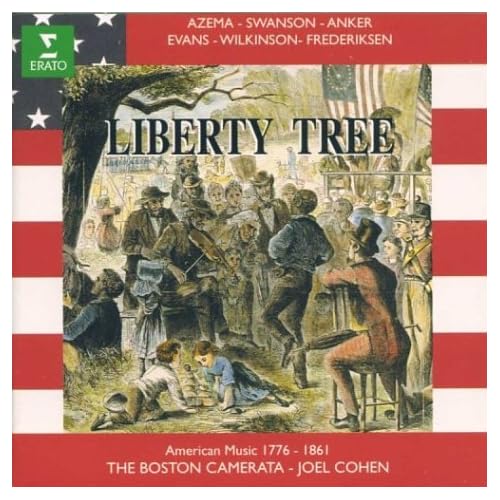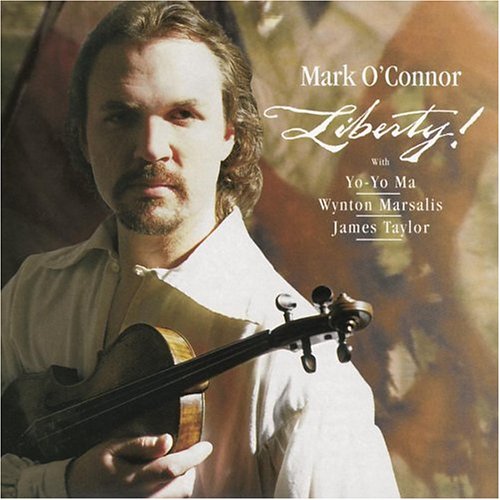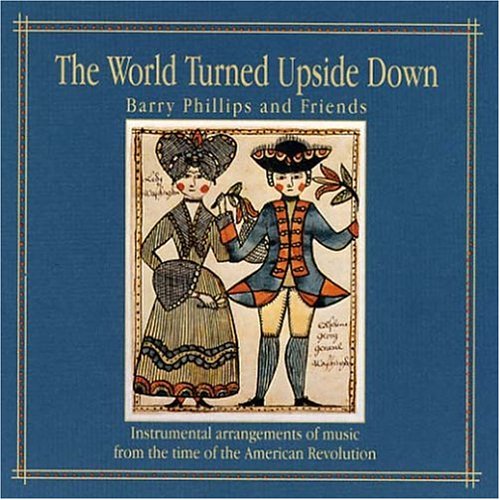Music Recommendations: Some Alternative (Revolutionary?) Sounds for the 4th of July
If you're sick of hearing the same old Sousa/Copeland/Berlin-as-performed-by-the-Boston Pops/National Symphony fare that is generally offered up on the 4th of July (and I won't even mention the more cheezy patriotic offerings that have come out within the last 30 years), I have some CD recommendations that will go a long way toward curing what musically ails you.
First up is Liberty Tree by The Boston Camerata.
 The Boston Camerata are favorites of mine whenever it comes to early music. And this selection of early American music is no exception. From the program notes:
The Boston Camerata are favorites of mine whenever it comes to early music. And this selection of early American music is no exception. From the program notes:Our view of the American past is shaped by many things -- dimly remembered history lessons from our earliest school days; the posturings of present-day public people; and, perhaps most importantly, by the popular media -- radio, television, and the movies. Talk about static! Can we ever, then, experience our collective past as it "really" was? Hardly -- those days are gone forever. But, on the other hand, can we get closer to our roots than heretofore? Can we eliminate some of the distortion and noise? At least as far as music goes, I am convinced that a cleaner, truer approach is possible.Program includes:
The partsongs, marches, anthems, jigs, and ballads we perform for you here were all part of American life during the early decades of the country's existence: between the founding of the Republic and the Civil War. This, the everyday music of villages and towns, represents a hybrid tradition. Notated and harmonised in a rough, pragmatic way by musicians of the time, these pieces are not learned or complex enough to be taken seriously as "high" art by most music historians. Yet, since they managed nonetheless to make their way onto paper and into "polite" society, they are surely a bit more refined and worldy-wise than the folk song of the truly rural settlers. It is in this neglected, between-two-worlds repertoire, I maintain, that we can find much of the soul of early America.
A few of our works have retained popularity since those earlest times; some tunes, once secular "hits", now survive, spiritualised, in the still-vital shapenote hymn tradition. But many of these pieces, once beloved in their day, have not been heard in generations, and have been transcribed and edited specially for this recording from original sources.
You will hear in our performances the kinds of musical instruments that were played a century and a half ago; softer and more rounded in tone than their modern counterparts. Though we don't know with any certainty how "art" music may have been sung in nineteenth-century America, the timbres of the musical instruments provide important parallel clues as to how the human voice may have sounded before the age of roaring tenors and the Boeing 747.
The result? You will experience a lighter, less aggresive tonal pallette than the one we tend to associate with patriotic fervour, or with history with a capital H. Yankee Doodle can be heard as the perky, disrespectful teenage piece it originally was. On the Road to Boston makes one visualise the road, perhaps the old one from Quincy and Dorchester; much narrower than the commuter-clogged Southeast Expressway, unpaved, with horse and foot traffic only -- and no billboards. And the untutored harmonies in a piece like Clovergreen give a truer, sharper sense of life on the (cultural) frontier than the sugary sweetness of the same tune played b y saxophones (as Auld Lang Syne) on New Year's Eve from coast to coast. True it is that we can't go back to those places, but fragments of what they once were do illumine and enrich our contemporary imagination.
[More]
I. Liberty Tree
1 Yankee Doodle 2'56
2 Chester 2'11
3 Liberty Tree 2'34
4 The Boston March 1'11
5 David's Lamentation 1'45
6 Jefferson and Liberty 2'39
7 Rights of Woman 1'12
8 The Appletree 1'12
II. Dormant
9 Dormant 2'29
10 Hero and Leander 2'13
11 Mary's dream 3'59
III. Jolly Soldier
12 On the Road to Boston 0'49
13 Jolly Soldier 3'23
14 Jefferson and Liberty 1'03
15 Abraham's Daughter 2'19
16 Brave Wolfe 4'49
17 Irish air 1'22
18 The Blue Bells of Scotland 2'00
IV. The Working Boy
19 The Working boy 2'03
20 Poor old Maids 0'57
21 Bob in the Bed 0'32
22 Old Tare River 1'53
23 The Rose Tree (The Knoxville Harmony) 2'06
V. Parting Friends
24 Clovergreen 3'41
25 Parting Friends 3'46
26 Ode to Science
_______________
Next up is Liberty! by fiddler Mark O'Connor (with Yo-Yo Ma, Wynton Marsalis, and James Taylor).

This is the soundtrack from the excellent PBS series Liberty! The American Revolution. Here's a description of the recording from the PBS website:
The music for LIBERTY! The American Revolution features arrangements of traditional Revolutionary-era folk melodies by Mark O'Connor, as well as original compositions by Richard Einhorn and O'Connor. O'Connor, a Grammy Award-winning violinist, performs, along with: Grammy Award-winning cellist Yo-Yo Ma; Pulitizer Prize-winning composer and trumpet player Wynton Marsalis; David and Ginger Hildebrand; and the Nashville Symphony. O'Connor's "Song of the Liberty Bell" is the series' main theme. James Taylor and O'Connor perform the traditional song, "Johnny Has Gone for a Soldier," over the closing credits... American music of the revolutionary era drew upon the cultural influences of the people of the new nation - English, Scottish, Irish, German and African - and blended into a sound of its own. Through the interest and involvement of a remarkable collection of artists, that music has been recreated for LIBERTY! in a memorable soundtrack and score, from Sony Classical.Program includes:
1. Song Of The Liberty Bell
2. Johnny Has Gone For A Soldier
3. Surrender The Sword
4. Soldier's Joy
5. When Bidden To The Wake Or Fair
6. The World Turned Upside Down
7. Bunker Hill
8. Freedom
9. The Flowers Of Edinburgh
10. Brave Wolfe
11. Devil's Dream
12. Song Of The Liberty Bell
_______________
My third recommendation is a CD that I recently purchased (just last week, in fact) called Davy Crockett's Fiddle by Colonial Williamsburg musician Dean Shostak. It is fast becoming my favorite of the bunch.
 This recording features the fiddle that purportedly belonged to Davy Crockett. All the instruments and music on this CD are from the time of Davy Crockett (1786-1836). From the program notes:
This recording features the fiddle that purportedly belonged to Davy Crockett. All the instruments and music on this CD are from the time of Davy Crockett (1786-1836). From the program notes:I first learned about Davy Crockett's fiddle when I saw its picture in the April 2001 issue of USAToday; an old well-worn violin. That was the beginning of a wonderful musical adventure. I contacted the good folks at the Witte Museum, who owned the fiddle, and proposed that we have it restored. I wanted to make a recording of music of Davy Crockett's time on his very own fiddle accompanied by period instruments.Program includes:
They enthusiastically agreed, and we embarked on an remarkable historical journey; restoring the violin, researching and learning the music Davy Crockett would have played, and recording it right in San Antonio where he spent his final, heroic days.
When I returned to Williamsburg, VA, I assembled some of my favorite early American musicians together to create musical scenes from Davy's life using his own fiddle...
1. Perry's Victory
2. Yankee Doodle
3. Amazing Grace
4. Speed The Plow
5. Hunters of Kentucky
6. Shenandoah
7. Turkey In The Straw
8. Haste To The Wedding
9. German Waltz
10. The President's March (Hail Columbia)
11. Home Sweet Home
12. Durang's Hornpipe / College Hornpipe
13. Jefferson And Liberty
14. Soldier's Joy / Bonaparte's Retreat
15. Duke of Kent Waltz
16. Cindy
17. The Girl I Left Behind Me / Leather Breeches
18. Rock of Ages
19. Drink To Me Only With Thine Eyes
20. Star Spangled Banner
21. The Legend Of Davy Crockett
_______________
My final reccomendation is The World Turned Upside Down by Barry Phillips and Friends.

Of my recommendations, I've owned this recording the longest - I bought it on cassette tape many years ago (while I was still in law school), and recently purchased it again on CD. The title of the recording refers to the tune that tradition says the surrendering British troops played as they paraded by the victorious Continental and French Armies at Yorktown during the American Revolution - the tune is also known as the Cavalier (and later, Jacobite) ballad "When the King Enjoys His Own Again". (It's also the tune to which Sarah marched down the aisle at our wedding.)
Here's more about the recording:
Barry Phillips and Friends explore the colorful variety of music popular in late 18th and early 19th century America, from elegant Colonial drawing rooms to homely frontier hearths to rollicking waterside taverns. The title tune, according to legend, was played by Cornwallis' surrendering troops at Yorktown; the album also includes dances and folk songs (All The Pretty Little Horses, Rights of Man, Fisher's Hornpipe, Love in a Village) along with a suite of early American classical music by the Boston master William Billings. As always, liner notes provide colorful background history of the music and the times.Go here for the complete liner notes. Program includes:
1. The World Turned Upside Down 2:42
2. Love in a Village / Love Forever 3:05
3. The Rights of Man 3:20
4. When Jesus Wept 3:46 (by William Billings)
5. Billings Suite 3:48 (by William Billings)
6. Dutchess of Brunswick 2:21 (Traditional)
7. Young Widow/Black Joke 2:22
8. New German Spa 3:59
9. All The Pretty Little Horses 3:13 (Traditional)
10. Sweet Richard 4:07
11. Fisher's Hornpipe / Patterson's Hornpipe 4:55 (by James A. Fisher)
12. Rights of Conscience 4:19 (by Issachar Bates)
_______________
Whether you're a history buff, a fan of early American music, or just want something different to listen to on Independence Day, I HIGHLY RECOMMEND ALL of these recordings.
And, finally, there is one more recording that I'd like to mention, which I do not own, but which looks promising. It is titled Music of the American Revolution: The Birth of Liberty. This recording appears to cover some of the same ground as the recordings I've listed above, but is limited only to music of the American Revolution. Could be worth checking out.



1 Comments:
You forgot Project 86's - "Sincerely, Ichabod". Fitting for the traitors among us.
Publius
Post a Comment
<< Home